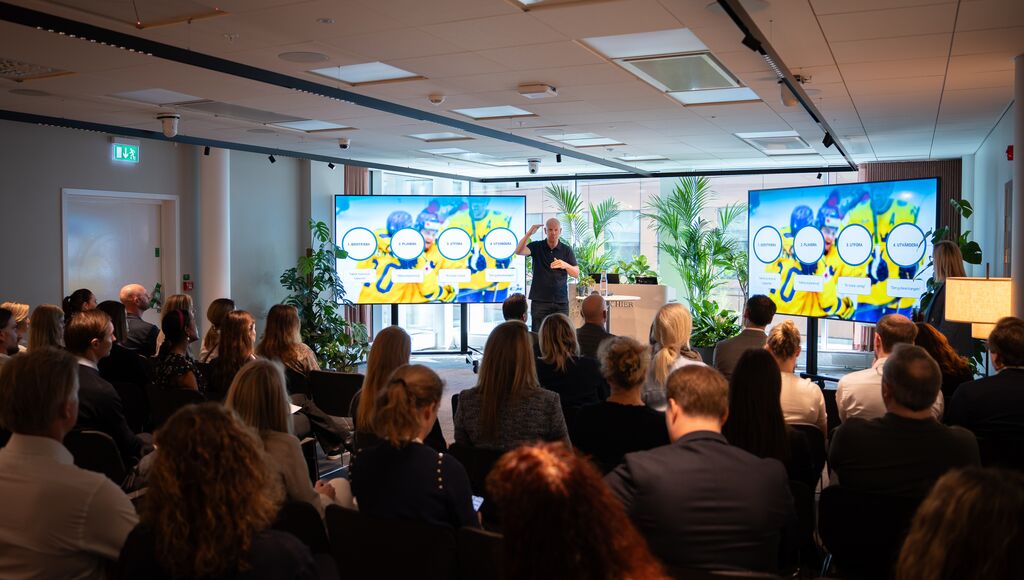
Ice hockey legend and Olympic gold medalist Mats Sundin discusses sustainable leadership at the Roschier leadership seminar
Insights|May 15, 2024
In today’s business world, leadership is often crucial for achieving the goals and visions that a company aims to reach. During the fall and spring, Roschier has invited various leaders to discuss different perspectives on leadership.
At Roschier leadership seminar, we had the honor of hosting Mats Sundin, one of Sweden’s greatest hockey players, with an Olympic gold and three World Championship titles. Mats, a former captain of the Toronto Maple Leafs and Sweden’s top NHL scorer, now works at IMR, promoting a healthier business environment.
Mats began by talking about his career and how, at a young age, it became clear to him that collaboration, preparation, and culture are important foundations for success. He shared an anecdote about when he, as a young player, arrived at the locker room and got to play with his idol, Guy Lafleur. When the others came to the locker room to change, Guy was already ready and said, “Preparation is everything if you want to have a long career,” a lesson that has influenced him to this day.
Mats mentioned several times during the conversation the importance of role models and how one should be curious, ask questions, seek help from those more experienced, and build success by utilizing others. He spoke about his own leadership as a long-time captain and how he worked hard to be a role model by talking less and doing more. He also mentioned the difficulty of balancing attention to detail with maintaining a long-term vision but noted that the good leaders he has had were adept at striking that balance.
Mats often returns to the topic of team spirit and culture. He mentions how culture, competence, and values all play a role in success. He refers to when Sweden won the Olympic gold in Turin in 2006 and explains that the difference from previous attempts was the team spirit. He explains how everyone’s skills were equally important for achieving results and that there was no star culture in the team.
As a leader, he has worked a lot with authenticity in his leadership, describing it as “staying true to oneself.” He emphasizes the importance of being a good example and considering the whole team; in hockey, equipment managers and physiotherapists are as important for success. He mentions how he took time to sit with them and have coffee, something that drew some attention since the NHL is a hierarchical organization. He also mentioned that building a culture is easier said than done; it relies heavily on everyone’s willingness and time. Celebrating successes is just as important as having dinner together, being honest, and building trust. When there is trust within a group, you can achieve much more than you might think.
An important aspect in sports as well as in business is the importance of recovery. He mentioned how his colleague and friend Therese Alshammar, also a multiple Olympic medalist, traveled the world to find the answer to the question of the most effective recovery. The answer from the research world was unequivocal and surprisingly simple: forest walks, comfortable shoes, turn off your mobile.
For leaders in Swedish sports, there is a model with four components that many return to and that Mats mentions as part of the recent successes in Swedish sports.
Identify:
Review the conditions and capacity that exist. Measure – where do I stand right now?
Plan:
Set what you want to achieve and determine the goal through goal-oriented planning that is also flexible enough to adapt to changing conditions.
Execute:
Here, Mats spoke about the importance of quality over quantity through the concept of “a sharp everyday life.” When it comes to training, one hour of good training is often better than four hours of training; there is even a risk that unwanted behaviors are ingrained. Decide what you want to become good at and try to filter out the rest.
Evaluate:
Measure, evaluate, and follow your results. Mats mentioned a model called the Golden Triangle, where one part is your own experience, one is your coach’s or manager’s experience, and the third part is based on measurable results. If all three parameters align, you are in a positive spiral and develop.
The Roschier leadership seminar series started in 2023. Please find the previous articles in the links below.
Caroline Farberger and Annie Lööf on value-based leadership
Peter Wallenberg Jr. and Lovisa Cavalli Wallenberg on leadership over time and generations